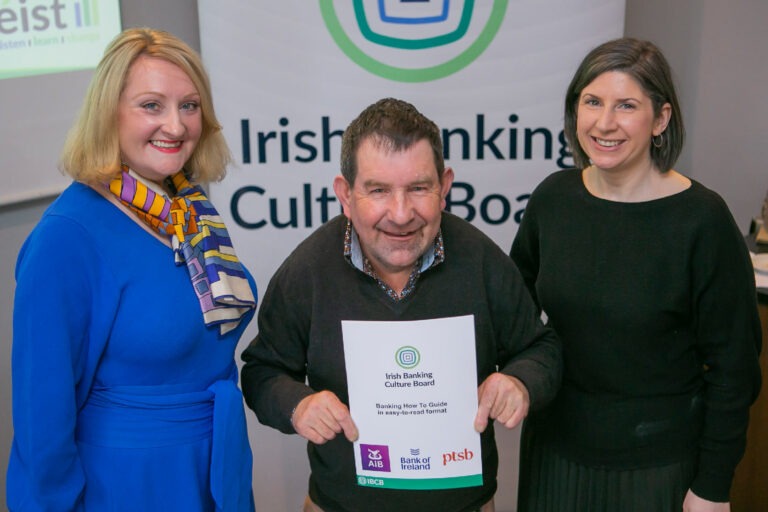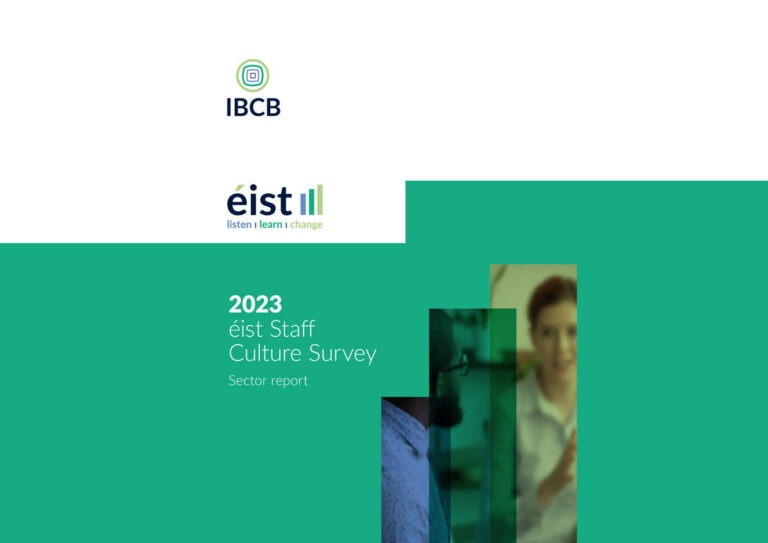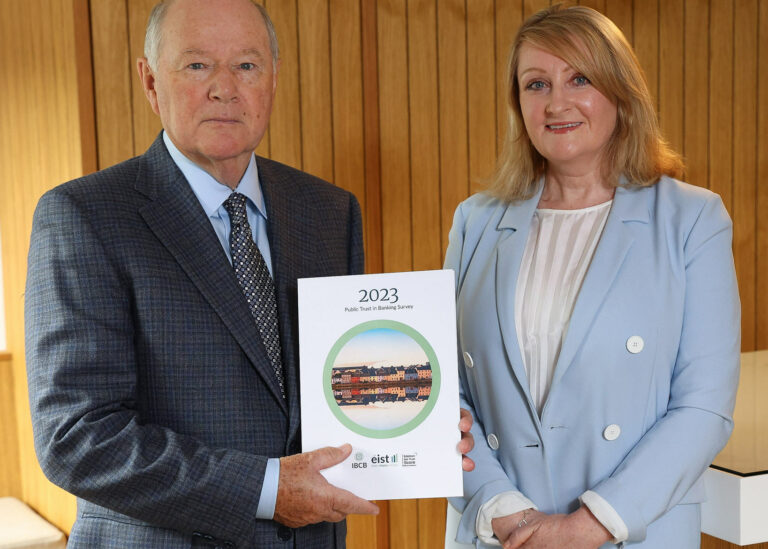IBCB Statement on conclusion of Central Bank of Ireland’s Tracker Mortgage Examinations
Today marks a milestone day for the Irish banking sector, its customers and its stakeholders. The Irish Banking Culture Board (IBCB) stands with the thousands of customers who have been impacted financially and emotionally by the shameful behaviour of the banks in relation to the sale and withdrawal of tracker mortgages. It is essential that today’s announcement acts as a book-end to the unacceptable behaviour and culture within banking which contributed to the tracker mortgage period, and that the issues identified by the Central Bank of Ireland (CBI) are not forgotten, but rather act as a source of ongoing motivation for lasting cultural and behavioural change.
The fine imposed today by the CBI on Bank of Ireland of €100.5 million brings the cumulative fines imposed on the five Irish retail banks[1] to over €272 million[2]. These fines are unprecedented and reflect the gravity of the CBI’s findings, however, as previously noted by the IBCB, it is essential that the human cost of the tracker mortgage related failings by the industry is not overshadowed by the size of the CBI fines and the costs of redress. In many instances this human cost is impossible to quantify, particularly given the financial impact coincided with the wider national and global economic crashes with resultant negative income consequences for many.
The CBI estimated in 2019 that some 315 homes (family homes and buy to lets) were lost as a direct and indirect result of trackers (through repossessions and voluntary surrenders[3]), however the impact on mental and physical health and family life, of the immense stress and distress caused to so many, the opportunities and aspirations foregone or postponed, is impossible to calculate, but no less real.
The IBCB has learned about these impacts through various means – via direct and often emotional one to one engagement with a representative group of impacted customers, via our ongoing engagement with customer representatives (including members of our own Board involved with representing customers impacted by tracker related issues) and wider industry stakeholders. In addition, we have met with the independent experts involved in the tracker mortgage appeals review panels in our member banks and have reviewed the CBI’s tracker mortgage related reports[4], its report on Behaviour and Culture[5] as well as aspects of other reports stemming from the banking inquiry[6].
We have also heard of the impact on bank staff – many of whom were also tracker mortgage customers – and many of whom felt unable to speak up about tracker related issues and other behavioural and cultural concerns, resulting in significant levels of stress.
As a Board, we have sought to learn from these insights and to use them to identify the priority areas we consider need to be focussed on in our member banks in order to assist them with building a roadmap to the post-tracker period, founded on sustained strategic focus on the lessons that have been learned, and those that continue to require focus.
Our views are also informed by our regular measurement and assessment surveys, known as ‘éist’ – which measure the Irish public’s trust levels in banking and also banking staff’s assessment of internal bank culture on an ongoing basis. The results of the IBCB’s most recent éist public sentiment survey published in July 2022, clearly illustrate that the trust which was shattered as a result of bank behaviour in the Great Financial Crisis (GFC) and, in particular, in relation to tracker mortgages, remains extremely low with most cohorts of bank customers. With some, trust is effectively absent.
This is not a good place to be for the Irish banking industry, or for the thousands of bank staff who are committed to serving their customers well and wish to do so with pride, and most importantly, this is not a good place for Irish bank customers who deserve to be served by an industry that acts with integrity and in which customers can have trust and respect.
Sincere apologies are important and are part of the healing process, but it is actions not words that are essential in this context. The IBCB acknowledges the focus by its member banks over the past number of years in improving culture and behaviour and while there has been progress, there remains much to be done. It is imperative that the issues identified by the CBI result in lessons being learned and fundamental changes in structures and procedures to protect and prevent similar issues arising again.
On this basis, we highlight six key areas of focus for the roadmap to the post-tracker banking industry, a number of which are founded on issues that the CBI has explicitly referred to in its tracker mortgage investigation reports:
- Customer focus;
- Decision-making;
- Communications;
- Speaking up & Being Heard;
- ‘Stop the Harm’ principles; and
- Individual accountability.
Our reflections on each of these areas are set out in the attached.
Neither the IBCB, nor our member banks, can change the mistakes and poor behaviour of the past. We must now look to the future. While today marks the end of the CBI’s formal investigations into the five IBCB member banks, the issues identified and the immense personal impact on thousands of bank customers and their families will continue to reverberate for years to come and must not be forgotten. The stark lessons of the CBI’s tracker mortgage investigations must be learned, revisited and reinforced regularly to ensure they form the basis of decision making and customer engagement by the banks into the future.
The IBCB will be holding a round table event in the coming months to which we will be inviting a range of stakeholders including some impacted customers, individuals involved in the appeals process, regulators, senior leaders from our member banks and members of our Board to reflect on the core behavioural and cultural issues we consider must lie at the heart of the post-tracker banking industry in Ireland.
Reflections on conclusion of the CBI’s Tracker Mortgage investigations
The IBCB cannot comment on the specifics of individual CBI investigations or settlements of our member banks, the details of which are subject to legal and regulatory confidentiality.
Our focus in this reflection is on the industry level issues identified by the CBI in its tracker investigations and which, it has determined, contributed to the severe and widespread customer detriment, and to reflect on how (& whether) we consider, based on our activities, these issues have been addressed to date by our member banks. The roadmap to the post-tracker banking industry in Ireland must include reference to these core issues:
- Customer focus;
- Decision-making;
- Communications;
- Speaking up & Being Heard;
- ‘Stop the Harm’ principles; and
- Individual accountability.
We intend to focus on these issues in the Roundtable we will hold in the coming months.
- Customer focus
The CBI has noted that ‘The Examination has exposed a clear lack of a consumer-focused culture in lenders. While many lenders publicly state they put their customers first, the evidence from the Examination suggests otherwise’[7].
The CBI has highlighted numerous regulatory breaches in this regard, in particular in relation to breaches of the Consumer Protection Codes[8] (CPC). These fundamental failings to adhere to the required principles of consumer protection must be learned from and not be repeated. The IBCB has been considering this issue through various means, focussing in particular on whether customer focus has improved in recent years as a result of the issues identified via the tracker mortgage reviews. We have done this via;
- asking and listening to the views of bank customers, stakeholders and bank staff in our éist surveys[9];
- considering the insights from our non-bank Board members (who are in the majority on the IBCB Board) as well as via regular engagement at Board level with relevant external parties who can give us an independent ‘coalface’ perspective of what they see happening vis a vis customer outcomes;
- listening to the views of the independently appointed Chairs of the Tracker Mortgage Appeal Panels in each of our member banks who have been involved in assessing many of the more complex and distressing cases of customers impacted by the loss of their tracker mortgages; and
- finally, and most importantly, we have met directly with a number of customers impacted by tracker mortgages and have listened to their views.
It is abundantly clear that there was a lack of real customer focus for much of the period relating to the sale and withdrawal of tracker mortgages. Customers have articulated to us how they felt decisions were taken primarily from the perspective of the banks, rather than with their best interests being to the forefront.
All IBCB member banks include customer focus and service within their core values and strategies and have made progress in recent years in translating these stated values into actions and initiatives aimed at improving outcomes for customers: the ‘voice of the customer’ has been integrated into formal and informal governance structures and decision-making, customer complaint data is analysed for insights and learnings, we have seen enhanced consultation and engagement with specific customer cohorts impacted by decisions and there has been rapid and proactive supports put in place for customers in vulnerable positions and impacted by significant events such as the payment breaks introduced during the Covid-19 crisis. However, it is clear that these efforts by the banks have yet to resonate with the majority of bank customers, whose low levels of trust in banking is largely driven by perspectives on the banks’ customer focus. Customers need to experience improved customer outcomes through their lived experience. Our most recent éist survey finds that ‘understanding customer needs’ is the most important driver of trust – increasing in priority from ranking 8 in 2021 to ranking 1 in 2022. The public has highlighted that a real and sustained focus on all of the customer centric trust behaviours is required by the banks. This must continue to be a priority area of focus for Bank Boards and Senior Executives. The IBCB will continue to focus on this area as a priority via our éist surveys and wider stakeholder engagement.
- Decision-making
The CBI has highlighted the detrimental impacts of the decision by the industry to withdraw tracker mortgage products from the market in 2008 without, in many instances, adequate consideration of the impact of this decision on different categories of customers: ‘lenders sometimes failed to take account of their obligations to existing customers, including customers who had a contractual right to a tracker rate of interest – or the legitimate expectation of a tracker rate based on documentation or other influencing factors – when their fixed rate mortgage expired’ [10]
“The legalistic approach taken by some banks to avoid doing the right thing is simply unacceptable”[11]
In our interactions with impacted customers and their representatives, we have heard repeatedly that the banks took an ‘overly legalistic view’ in relation to their obligations to customers impacted by tracker mortgages and, in many instances, prioritised the interest of the bank rather than the customer in making decisions. While this approach has been acknowledged by the banks and they have apologised for this, this again is a clear example of where actions not words are necessary to demonstrate a commitment to learning from past mistakes.
Legal contracts can be complex documents and frequently, as was the case with tracker products, there are multiple versions of documentation reflecting a variety of customer groups and circumstances. There is an onus on all in the industry, both directly and indirectly, including the banks, advisors, brokers and solicitors to upskill in order to be able to provide the right advice and to ensure that documentation is as clear as possible. Equally customers must be supported to ensure they understand the contracts they enter into. Supporting greater financial awareness and preparedness for an increasingly digital environment, in particular for customers who may be in a vulnerable position, is a key area of focus for the IBCB and our member banks.
The business of banking is founded on trust and ethical behaviour is a cornerstone of trust. The manner in which decisions are made is a key barometer of an institution’s ethical conduct. To gain trust, an institution’s internal and external stakeholders must have confidence that decisions, at all levels, are made in a fair and transparent manner. Clearly, decisions in relation to tracker mortgages were not always made in this manner and a focus on ethical decision-making is one means of protecting against a recurrence.
On this basis, we selected this as a priority area to focus on and one of the outputs of this has been the development of the IBCB DECIDE Framework which was published in October 2020. This is a practical decision-making framework aimed at staff at all levels in our member banks, from the top down. DECIDE is intended to be used on a stand-alone basis, or in conjunction with an institution’s existing internal decision-making frameworks, to form a benchmark of good practice in decision-making.
Overall, while we have seen some evidence of improvement in the customer centricity of the decision-making processes in our member banks, we would emphasise the importance of this remaining a priority area of focus requiring consistent support and role-modelling from the top down within organisations. Other key elements of sound decision-making include robust and functioning ‘speaking up’ processes, individual accountability and diversity of perspective – the first two of which are core areas of focus of the IBCB and are described further below. While we have not to date focussed specifically on the issue of diversity (gender and cognitive) and its importance to a healthy internal culture which values alternative views, we receive updates from each of our member banks on their progress in this regard and we expect continued progress in these crucial areas.
- Communications
‘60 per cent of affected accounts arose from contractual or transparency failings’[12]
The manner in which banks communicate with their customers, particularly those in a vulnerable position, in relation to legal and contractual disputes and wider concerns stemming from economic and financial distress, is a real barometer of their overall culture and commitment to being customer centric. While it is the role of the CBI to assess whether banks adhere to the consumer protection requirements of the Consumer Protection Code (CPC) and other relevant regulation in relation to the provision of sufficiently detailed and clear information to customers, the IBCB recognises the criticality of fair and transparent communications with customers, including the ability for customers to speak directly with the bank when required. Over recent years, we have been focussing on a range of specific initiatives such as improving documentation and communication on issues such as bereavement services, basic bank accounts and SME supports as well as encouraging our member banks to make explicit commitments to enhancing their communications, particularly relating to material changes impacting customers.
All of the stakeholders we have engaged with have strongly emphasised the impact poor, and in some instances overly aggressive and intrusive, communications from banks had on tracker mortgage impacted customers. While most acknowledge that there have been some improvements over recent years, this is an area that must continue to be prioritised and the lessons learned to mitigate the risk of future customer detriment and distress due to unfair or unclear communications.
- Speaking Up and Being Heard
There has rightly been much debate about the role of ‘speak ups’ and ‘psychological safety’ in the context of the tracker mortgage reviews and the associated impact on staff stress levels. From the perspective of the IBCB, the manner in which leaders, and their organisations, manage the ‘Speak up’ process is very telling regarding the nature of their individual ethos and culture. If an organisation is not serious about fostering an environment where people feel ‘safe’ to air alternative views be that at meetings or in one to ones, or in ensuring that the process around the handling of formal ‘speak-ups’ is robust, transparent and confidential, then it will be extremely difficult, if not impossible to succeed in delivering real cultural change. An open, inclusive, positive, and safe working environment must be founded on a structure that promotes the right of individuals to speak freely and openly regarding issues that concern them, or indeed things that can be improved and made more efficient. People must feel that it is possible, and indeed that it is encouraged, to challenge – in a positive manner – the status quo. This culture of openness and positive challenge is important to instil at Board level and all the way down throughout an organisation. Without this environment, there is a real risk that individuals (be they Board, senior management or more junior staff) will feel disempowered and irrelevant.
The IBCB has focussed on this as a priority issue since our establishment and it is an explicit area of assessment in our bank staff surveys. Each of our member banks has also been concentrating on this issue internally via enhanced training, documentation and communications. Our most recent éist bank staff survey pointed to substantial improvements in relation to speaking up across all five of our member banks and the sector generally[13]. While this progress augurs well for the future, there is no room for complacency and the IBCB will continue to prioritise this as an issue.
- Stop the Harm principles
A core objective of the CBI’s tracker mortgage reviews was to require the banks to fully address the impact their actions had on affected customers. To help achieve this aim, the CBI developed ‘Stop the Harm’ principles, which included requiring banks to ‘stop any potential harm being caused to customers at the earliest possible time’, including preventing further detriment to customers occurring after the CBI’s examination commenced.
The overall performance of the banks in relation to adhering to these principles has not been acceptable in the context of tracker mortgages. The root causes of this failure to comply with the principles are manifold – ranging from inadequate resources, manual processes and paper-based records, weaknesses in the three lines of defence including poor procedures and controls, siloed approaches to the identification of impacted customer cohorts and unclear and delayed communications. Through our engagement with customers, their representatives and via the insights of many of our Board members, we have heard how this failure to ‘stop the harm’ directly impacted customers and their families. We have heard from our member banks how they have since looked to learn from and address these failures including via significant investment in risk management and IT systems for maintenance of customer documentation and enhanced governance and oversight to protect against similar failures in the future. The real test of whether this has been effective will only be in the manner in which future customer impacting issues are addressed and it will therefore remain a key area of focus for the IBCB.
- Individual accountability
There has understandably been much disappointment and upset at the lack of enforcement to date against individuals as a result of the CBI’s tracker mortgage investigations. Individual accountability is a cornerstone of positive behaviour and culture. To regain trust, it is imperative that stakeholders recognise that the banking industry’s commitment to behavioural and cultural change is more than just words, but rather a real commitment that involves change to how business is done and is underpinned by a framework which enables individuals, as well as organisations, to be held to account. In addition to enhancing trust with stakeholders, the introduction of the individual accountability regime has the potential to yield further positives for those institutions subject to it, via clearer decision-making and overall governance processes, and, by extension, better and more transparent risk management.
The IBCB and each of our five member banks are strong advocates for the introduction of an effective individual accountability regime in Ireland, similar to that in successful operation in many other jurisdictions globally. Much of the focus and debate to date in relation to the regime has been on the importance of holding individuals to account for their behaviour and the penalties which will be available to the regulator when it is proven that such behaviour has been inappropriate. This is understandable in the context of past misbehaviour in the Irish financial services industry, in particular in relation to tracker mortgages, and the difficulties in holding individuals to account in that regard. However, it is also important to focus on the potential positive aspects of individual accountability, and how it can be used to promote and underpin the right behaviours and decision-making via embedding and promoting the new regime internally with bank staff. An aspect of this which requires fair and balanced consideration, and which the IBCB will be considering further in the coming period, relates to the internal methods and tools which can be used by firms to incentivise the right behaviours and penalise inappropriate behaviours.
The introduction of an individual accountability framework in Ireland offers a real opportunity to assist both the regulated, the regulator and wider Irish society to work cooperatively and positively together in moving forward into a new phase of engagement founded on mutual respect and trust, informed by the lessons from the past.
[1] AIB (including EBS), Bank of Ireland, KBC Bank Ireland, PTSB and Ulster Bank DAC
[2] €100.5m Bank of Ireland, €83.3m Allied Irish Banks p.l.c. (AIB) and €13.4m EBS d.a.c., PTSB €21m, KBC Bank Ireland €18.3m and Ulster Bank in excess of €37m in relation to tracker mortgage related failings1
[3] The Tracker Mortgage Examination – Final Report, July 2019, Central Bank of Ireland
[4] The Tracker Mortgage Examination – Final Report, July 2019, Central Bank of Ireland & subsequent CBI individual IBCB member banks enforcement notices
[5] Behaviour and Culture of the Irish Retail Banks, Central Bank of Ireland, July 2018
[6] Report of the Joint Committee of Inquiry into the Banking Crisis Houses of the Oireachtas (Inquiries, Privileges and Procedures) Act, 2013, January 2016; Misjudging Risk: Causes of the Systemic Banking Crisis in Ireland, Report of the Commission of Investigation into the Banking Sector in Ireland (‘Nyberg Report’, March 2011
[7] The Tracker Mortgage Examination – Final Report, July 2019, Central Bank of Ireland
[8] CPC 2006 and CPC 2012
[9] IBCB éist Bank Staff Survey & Public Trust in Banking Report 2021 and 2022 (available www.ibcb.ie)
[10] The Tracker Mortgage Examination – Final Report, July 2019, Central Bank of Ireland
[11] Statement by Minister Paschal Donohoe, 25 October 2017
[12] The Tracker Mortgage Examination – Final Report, July 2019, Central Bank of Ireland
[13] IBCB éist Bank Staff Survey 2021: 3 in 5 bank staff (58%) feel that their organisation’s commitment to building a speak-up culture has strengthened and importantly there has been a 10 point increase to 69% of those who had a concern and felt comfortable to raise it in the period; A further very positive finding for the Irish sector is that 75% of staff report that people who make a mistake are treated fairly – this is a key indicator of culture – reflective of ‘organisational justice’ and is 3 points ahead of the global benchmark.




